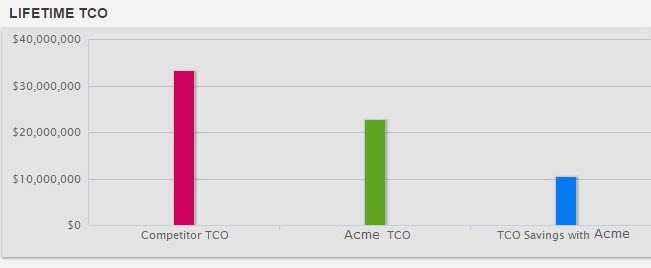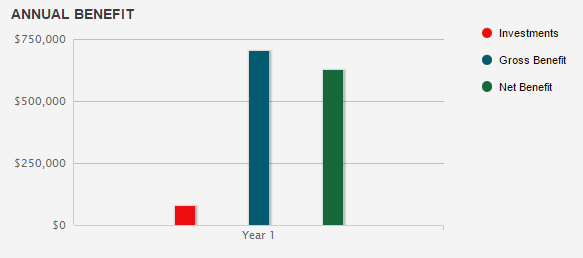
Quite often sales and marketing professionals seek a TCO analysis to help grow sales when an ROI calculation would actually be a better choice. Many people assume they need a TCO analysis to close deals, when an ROI analysis would actually be far more beneficial. I know this because I get frequent requests to create TCO tools, and my first question is “What problem are you trying to solve?”
The answer to that question dictates whether a TCO tool or ROI tool would be a better fit. Unless the answer is some variation of “We are frequently in competitive bid situations against competitor X,” then it is likely an ROI tool would be a better fit.
How a TCO Tool Works
TCO stands for Total Cost of Ownership. A TCO tool shows a financial comparison between your offering and one or more competitor’s offerings. That’s because a TCO analysis always takes two or more alternatives, examines the cost and value dimensions of each, and shows which of the two alternatives is the better financial option.

Here’s what most people miss: a TCO comparison is only vital when you’re consistently in head-to-head competition with another vendor. And a classic bakeoff is actually more rare than people think.
How an ROI Tool Works
The far more common scenario is that you’re having trouble getting the customer to take action, period. The customer is happy enough with the status quo or unable to secure budget for the project. Whatever the case, you aren’t demonstrating enough of a business justification to move forward.
In such situations, you’re better off showing the customer ROI calculations generated by an ROI tool. That’s because an ROI analysis shows a very specific set of metrics (different than those from a TCO tool) that are highly likely to spur your customer to action. These include:
- The total value created by your solution versus the customer’s current state
- The investment required to deploy your solution
- The cost of delaying or not moving forward with your solution
- All of the key financial metrics that will be needed to cost-justify the project including ROI, NPV, Payback Period, etc.

These metrics are all part of any good business case. And a cost-justified business case is key to convince CFOs or any other financially-minded decision maker that an investment in your solution is in their economic best interest. Once they see the numbers, they should be far more motivated to act.
The Risks of Using a TCO Analysis in the Wrong Situation
Let’s say you’re still attached to the idea of a TCO analysis that shows how you’re better than a specific competitor. What happens when you use a TCO analysis in the wrong situation? Two potential risks exist.
Risk #1: You introduce the prospect to your competitor.
Remember that a TCO analysis always compares two alternatives. For example, how Solution A compares to Solution B, or how Product X compares to Product Y.
If you use a TCO tool to convince your prospect to choose you over your competitor but you’re not actually involved in a competitive selling situation, then you’ve just introduced your prospect to an alternate option (and even if you still have a better TCO, that is likely to slow the buying process).
Risk #2: You fail to show decision makers the money.
Again, if your solution will require the CFO or another executive to approve the purchase, you’ll get better results with ROI calculations. That’s because a TCO analysis typically doesn’t show the total value your solution will deliver. It only shows how your solution compares to an alternate solution, which means you won’t have the cost justification necessary to close the deal.
At times, you might actually need both a TCO analysis as well as an ROI analysis. But in many cases, you’re much better off showing the prospect ROI calculations rather than a TCO analysis.









